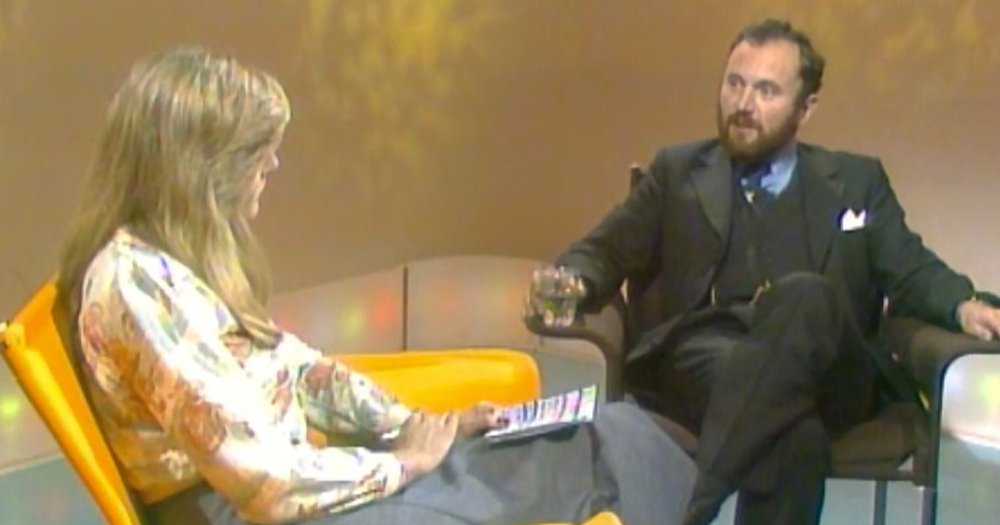With the advances we’ve made as a community in the last few years, it can sometimes be overlooked the sheer bravery it took for LGBTQ+ people to proudly share who they were with the world in decades gone by. In the first part of a new mini-series, we take a dip into the RTÉ archives to explore iconic moments of queer Irish history as seen on TV.
First, we’re reeling it back to 1975 in what was likely one of the earliest interviews with an openly gay person on Irish television.
1. ‘Irish Gay Rights Movement’, 1975

In this episode of Last House, Chairman of the Irish Gay Rights Movement, David Norris, talks to Áine O’Connor about the newly-founded IGRM and his experience growing up queer in Ireland. Speaking in the interview, David tells us:
“I was allowed to grow up, through my adolescence, believing that I was possibly the only homosexual in Ireland. Not knowing that there were indeed many thousands of other similarly isolated people here … I didn’t realise that I was part of a very large and isolated community in the country.”
The clip also features some inspiring words of advice from American gay rights activist, Dr. Franklin E Kameny. “To the homosexuals in Ireland, I say: Remember, believe, deeply and firmly; Gay is good and it’s up to you to make gay in Ireland better.”
2. ‘Gay Rights Gaining Ground’, 1977

Here, in this clip from Tuesday Report, RTÉ explores the IGRM further as Cathal Shannon meets with some of its members to discuss how views surrounding sexual orientation in Ireland are changing. There’s also some fantastic footage of a gay disco, the Phoenix Club, held in Dublin with everyone decked out in the hottest ’70s fashion (flares and all).
Closing the report, Cathal states: “So, unless society changes, the homosexual will always be the outsider. The man or woman out of step. Their attributes will be ignored. Their sexuality condemned. So really it’s not a matter for lawyers, for doctors, for clergymen alone but for all humanity.”
We’d like to point out that the information in this feature by RTÉ may be inaccurate. The setting of the disco was not at the Hirschfeld Centre in 1977 since the Hirschfeld opened in 1979.

British queer theatre group, Gay Sweatshop Company, arrived to Trinity College Dublin in 1978 for a week-long run of the play, As Time Goes By.
According to their manifesto, the aim of the group was “to increase the general awareness of the oppression of sexuality, both gay and straight, the impact it has on people’s lives and the society that reinforces it.”
Here, Bruce Howard Bayley plays Magnus Hirschfeld (the same man who inspired the name of the Hirschfeld Centre) in an excerpt from the play in which he plays on the definitions of ‘queer’ and ‘normal’ as they were in the late ’70s.
4. ‘Freedom To Be Yourself’, 1980

Aine O’Connor meets transgender woman, Claire, and “cross-dresser”, Isabel for this episode of Summerhouse. Together, they discuss gender identity, family life and the value of socialising with others who also identify as trans.
Claire is one of the founders of a social club for transgender people and their partners where approximately 20 members would attend every week. The club also provided a counselling service. On average they received over 500 phone calls a year and 400 people attended the club annually.
Isabel tells Aine how to her, “cross-dressing” has no impact on her masculinity and for many people it simply fulfils a need.
Some of the terminology surrounding transgender identity used in this report is dated. It’s also certainly worth noting that these interviews were recorded at a time when terms like genderqueer and non-binary were widely unknown to the community at the time.
5. ‘Hirschfeld Centre Home Of Gay Liberation’, 1981

It’s 1981 and Ireland’s Eye takes a trip to the Hirschfeld Centre in Dublin, Ireland’s first dedicated LGBTQ+ space, to find out about life as a gay person in Ireland.
Having opened in 1979, it provided a safe space for the community to come together at a time when queer identity was not widely discussed and homosexual activity was still illegal. Hirschfeld was decked out with a café, a small cinema and even its own disco, named Flikkers.
It was also here that the National Gay Federation (NGF) was established. Many of its members are featured in this clip, including one man who explains why a space like Hirschfeld is so important for the community.
“It’s possible for gay people to come in and relate to themselves. Discover their own personalities, discover their own sexuality and then go back out into the world that bit more confident … this raises their own profile and encourages other people to do likewise.”
Don’t forget to tune into the live launch of Project Arts Centre’s ‘QUEER-IN-PROGRESS. TIMELINE: ONLINE ARCHIVE’ in our In & Out Special on Wednesday March 31 at 7pm. More details on the event here.
© 2021 GCN (Gay Community News). All rights reserved.
Support GCN
GCN is a free, vital resource for Ireland’s LGBTQ+ community since 1988.
GCN is a trading name of National LGBT Federation CLG, a registered charity - Charity Number: 20034580.
GCN relies on the generous support of the community and allies to sustain the crucial work that we do. Producing GCN is costly, and, in an industry which has been hugely impacted by rising costs, we need your support to help sustain and grow this vital resource.
Supporting GCN for as little as €1.99 per month will help us continue our work as Ireland’s free, independent LGBTQ+ media.

comments. Please sign in to comment.